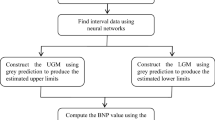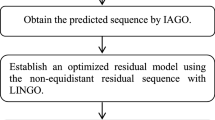Abstract
Forecasting the demand of product materials required for industries can help practitioner to formulate financial and marketing strategies. Available data are often nonlinear and real-valued, but samples are often derived from uncertain assessments, without adhering to any statistical assumptions. Furthermore, to provide the degree of variation associated with forecasts, it is preferable to estimate an interval consisting of the upper and lower bounds, rather than a single predicted value at each time period. Although non-statistical grey prediction is appropriate in such situations, previous interval grey prediction models were bounded. This study thus develops a neural-network-based interval grey prediction model and focus on the evaluation of the reliability of estimated intervals. In light of the importance of printed circuit boards (PCBs) to the manufacture of electrical and electronic products, the performance of the proposed model was verified by forecasting PCB product values. The results show that the proposed model performs well among considered interval grey prediction models.





Similar content being viewed by others
Explore related subjects
Discover the latest articles, news and stories from top researchers in related subjects.Data availability
The data that support the findings of this study are available from the Prismark statistics.
References
Angrist JD (2003) Fundamentals of artificial neural networks. The MIT Press, Cambridge, MA, A Bradford Book
Cankurt S, Subasi A (2015) Developing tourism demand forecasting models using machine learning techniques with trend, seasonal, and cyclic components. BALKAN J Elect Comput Eng 3(1):42–49
Chatfield C (2016) The analysis of time series: an introduction. CRC Press, London
Chen Y, He K, Zhang C (2016) A novel gray wave forecasting method for predicting metal prices. Resour Policy 49:323–331
Chen YY, Liu HT, Hsieh HL (2019) Time series interval forecast using GM(1,1) and NGBM(1, 1) models. Soft Comput 23:1541–1555
Ding S, Li R (2021) Forecasting the sales and stock of electric vehicles using a novel self-adaptive optimized gray model. Eng Appl Artif Intell. https://doi.org/10.1016/j.engappai.2020.104148
Ding S, Li R, Wu S (2021a) A novel composite forecasting framework by adaptive data preprocessing and optimized nonlinear gray Bernoulli model for new energy vehicles sales. Commun Nonlinear Sci Numer Simul. https://doi.org/10.1016/j.cnsns.2021.105847
Ding S, Li R, Tao Z (2021b) A novel adaptive discrete gray model with time-varying parameters for long-term photovoltaic power generation forecasting. Energy Convers Manag. https://doi.org/10.1016/j.enconman.2020.113644
Ding S, Li R, Wu S, Zhou W (2021c) Application of a novel structure-adaptative gray model with adjustable time power item for nuclear energy consumption forecasting. Appl Energy. https://doi.org/10.1016/j.apenergy.2021.117114
Forward Business Information (2019), Report of market perspective and investment strategy planning on China Printed circuit board manufacturing industry (2019–2024), Technical Report No. IM38229, iiMedia Research, Hong Kong, China.
Hu YC (2009) Functional-link nets with genetic-algorithm-based learning for robust nonlinear interval regression analysis. Neurocomputing 72:1808–1816
Hu YC (2017) Electricity consumption forecasting using a neural-network-based gray prediction approach. J Op Res Soc 68(10):1259–1264
Hu YC (2020) Energy demand forecasting using a novel remnant GM(1,1) model. Soft Comput 24:13903–13912
Hu Z, Gao C, Su Q (2021) A novel evolutionary algorithm based on even difference gray model. Expert Syst Appl. https://doi.org/10.1016/j.eswa.2021.114898
Huang YL, Lin CT (2011) Developing an interval forecasting method to predict undulated demand. Qual Quant 45:513–524
Huang L, Zhang BL, Huang Q (1998) Robust interval regression analysis using neural networks. Fuzzy Sets Syst 97:337–347
Hwang C, Hong DH, Seok KH (2006) Support vector interval regression machine for crisp input and output data. Fuzzy Sets Syst 157:1114–1125
Intelligence Research (2018), 2019–2025 Annual research and consultation report of panorama survey and development strategy on China PCB industry, Technical Report No. R689087, Intelligence Research Group, Beijing, China.
Ishibuchi H, Tanaka H (1992) Fuzzy regression analysis using neural networks. Fuzzy Sets Syst 50:257–265
Ishibuchi H, Nii M (2001) Fuzzy regression using asymmetric fuzzy coefficients and fuzzified neural networks. Fuzzy Sets Syst 119:273–290
Jeng JT, Chuang CC, Su SF (2003) Support vector interval regression networks for interval regression analysis. Fuzzy Sets Syst 138:283–300
Lee YC, Wu CH, Tsai SB (2014) Gray system theory and fuzzy time series forecasting for the growth of green electronic materials. Int J Prod Res 52:2931–2945
Li K, Liu L, Zhai J, Khoshgoftaar TM, Li T (2016) The improved gray model based on particle swarm optimization algorithm for time series prediction. Eng Appl Artif Intell 55:285–291
Li G, Wu C, Zhou M, Liu A (2019) The combination of interval forecasts in tourism. Ann Tour Res 75:363–378
Liu S, Lin Y (2010) Gray information: theory and practical applications. Springer-Verlag, London
Liu S, Yang Y, Forrest J (2017), Gray data analysis: methods, models and applications, Springer, Berlin.
Marques AC, Cabrera JM, Malfatti CF (2013) Printed circuit boards: a review on the perspective of sustainability. J Environ Manag 131:298–306
Qiu RTR, Wu DC, Dropsy V, Petit S, Pratt S, Ohe Y (2021) Visitor arrivals forecasts amid COVID-19: a perspective from the Asia and Pacific team. Ann Tour Res. https://doi.org/10.1016/j.annals.2021.103155
Shih CS, Hsu YT, Yeh J, Lee YP (2011) Gray number prediction using the gray modification model with progression technique. Appl Math Model 35(3):1314–1321
Suganthi L, Samuel AA (2012) Energy models for demand forecasting-A review. Renew Sustain Energy Rev 16:1223–1240
Sun W, Xu Y (2017) Research on China’s energy supply and demand using an improved gray-Markov chain model based on wavelet transform. Energy 118:969–984
Tan PN, Steinbach M, Kumar V (2005) Introduction to data mining, pearson addison Wesley, Boston.
Tanaka H (1987) Fuzzy data analysis by possibilistic linear models. Fuzzy Sets Syst 24:363–375
Tanaka H, Uejima S, Asai K (1982) Linear regression analysis with fuzzy model. IEEE Trans Syst Man Cybern 12:903–907
Toksari MD (2009) Estimating the net electricity energy generation and demand using ant colony optimization approach: case of Turkey. Energy Policy 37:1181–1187
Taiwan Printed Circuit Association (2019), The gaps of technical blueprint of Taiwan printed circuit boards, Printed Circuit Boards Quarterly, No. 84.
Tutun S, Chou CA, Canıyılmaz E (2015) A new forecasting framework for volatile behavior in net electricity consumption: a case study in Turkey. Energy 93:2406–2422
Wang ZX, Jv YQ (2021) A non-linear systematic gray model for forecasting the industrial economy-energy-environment system. Technol Forecast Soc Chang. https://doi.org/10.1016/j.techfore.2021.120707
Xia C, Wang J, McMenemy KS (2010) Medium and long term load forecasting model and virtual load forecaster based on radial basis function neural networks. Electr Power Energy Syst 32:743–750
Xie N, Liu S, Yuan C, Yang Y (2014) Gray number sequence forecasting approach for interval analysis: a case of China’s gross domestic product prediction. J gray Syst 26(1):45–58
Xu N, Dang Y, Gong Y (2017) Novel gray prediction model with nonlinear optimized time response method for forecasting of electricity consumption in China. Energy 118:473–480
Zeng B, Li C, Zhou XY, Long XJ (2014) Prediction model of interval gray number with a real parameter and its application. Abstr Appl Anal. https://doi.org/10.1155/2014/939404
Zeng B, Liu SF, Xie NM, Cui J (2010) Prediction model for interval gray number based on gray band and gray layer. Control and Decision 25(10):1585–1592
Zhao H, Guo S (2016) An optimized gray model for annual power load forecasting. Energy 107:272–286
Funding
This research is supported by the Ministry of Science and Technology, Taiwan under grant MOST 110–2410–H–033–013–MY2.
Author information
Authors and Affiliations
Corresponding author
Ethics declarations
Conflict of interest
The author declares that they have no conflict of interest.
Human and animal participants
This article does not contain any studies with human participants or animals performed by the author.
Additional information
Publisher's Note
Springer Nature remains neutral with regard to jurisdictional claims in published maps and institutional affiliations.
Rights and permissions
About this article
Cite this article
Hu, YC. Neural-network-based interval grey prediction models with applications to forecasting the demand of printed circuit boards. Soft Comput 26, 11827–11838 (2022). https://doi.org/10.1007/s00500-022-06963-7
Accepted:
Published:
Issue Date:
DOI: https://doi.org/10.1007/s00500-022-06963-7




